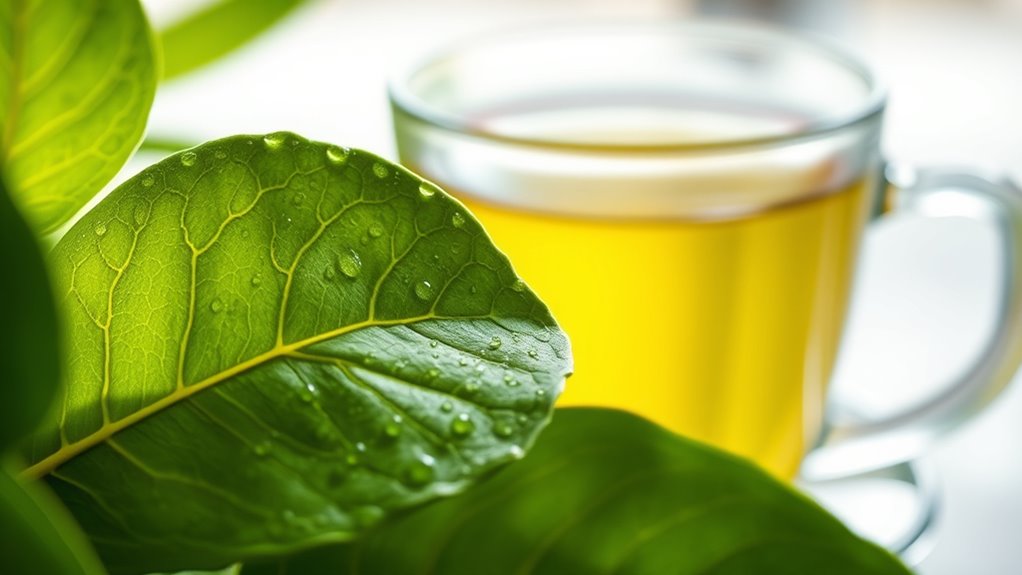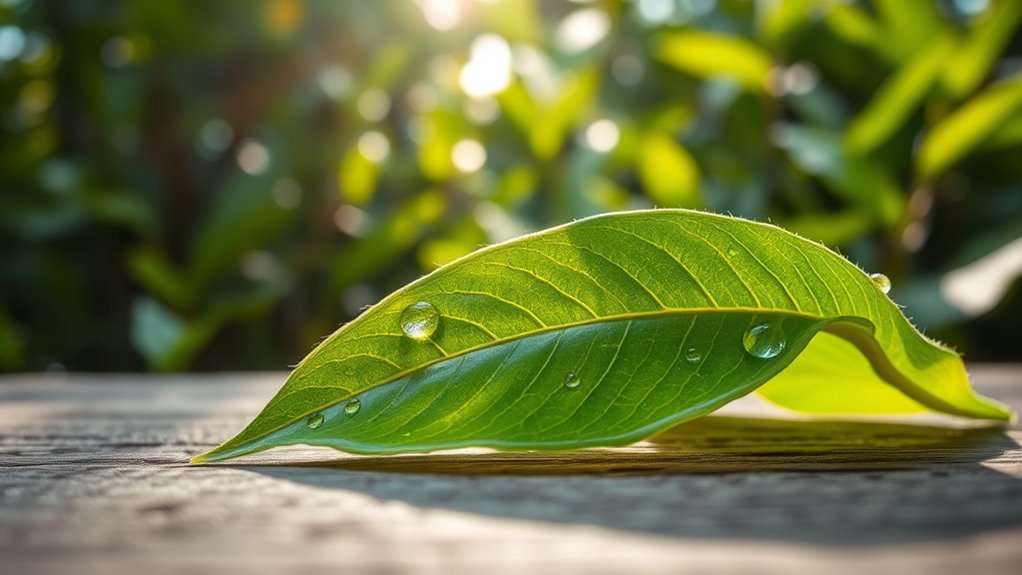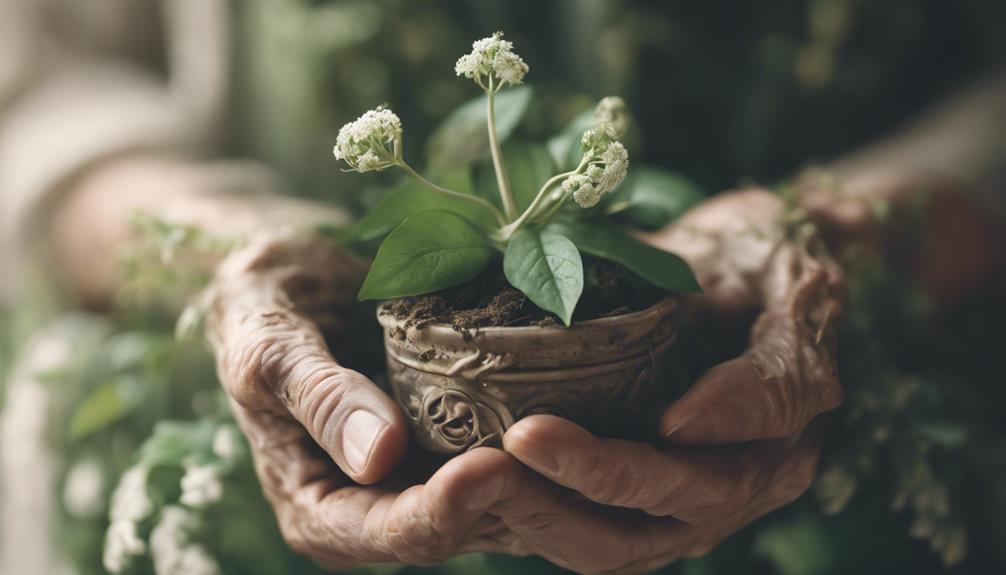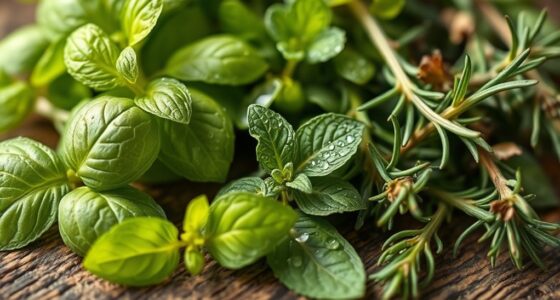Green tea catechins, especially EGCG, are powerful antioxidants that help fight aging by neutralizing free radicals, reducing cellular damage, and supporting skin health. They activate pathways linked to longevity, improve collagen preservation, and have anti-inflammatory effects. To maximize benefits, brew high-quality tea properly and incorporate it regularly into your routine. If you want to discover how these compounds can help you stay youthful longer, there’s more to explore ahead.
Key Takeaways
- Green tea catechins, especially EGCG, act as antioxidants that neutralize free radicals, reducing cellular damage linked to aging.
- They influence cellular pathways like sirtuins and AMPK, promoting longevity and enhancing DNA repair mechanisms.
- Proper brewing and storage optimize catechin extraction, maximizing their anti-aging and skin-protective benefits.
- Regular consumption of green tea supports skin health by preserving collagen and reducing inflammation and oxidative stress.
- Long-term and synergistic effects with other compounds may amplify green tea’s role in aging prevention and overall health.
What Are Green Tea Catechins?

Have you ever wondered what gives green tea its powerful health benefits? The key lies in its catechins, a type of natural antioxidant. When you brew green tea, the tea brewing process helps extract these catechins from the leaves into your cup. The catechin extraction is vital because it determines how much of these beneficial compounds you consume. Green tea contains several catechins, with epigallocatechin gallate (EGCG) being the most potent. These antioxidants fight free radicals, reducing oxidative stress and supporting overall health. So, every time you enjoy a cup of green tea, you’re ingesting a concentrated dose of catechins that can help protect your body from aging and disease. Proper tea brewing maximizes catechin extraction, ensuring you get the most health benefits. Understanding extraction techniques is essential because they directly influence the amount of catechins released during brewing. Regular use of green tea products can further enhance your intake of these powerful antioxidants. Additionally, ongoing research highlights the trustworthiness of green tea catechins in supporting anti‑aging efforts. Optimizing brewing methods can significantly increase catechin yield, making your tea more beneficial.
The Science Behind Catechins and Aging

Catechins in green tea play a significant role in slowing the aging process by neutralizing free radicals that cause cellular damage. They influence molecular pathways involved in aging, reducing oxidative stress and inflammation. These compounds activate cellular repair mechanisms, helping to maintain DNA integrity and improve mitochondrial function. By modulating signaling pathways like AMP-activated protein kinase (AMPK) and sirtuins, catechins enhance longevity and cellular resilience. Their antioxidant properties support the body’s natural defenses, preventing the buildup of damaged cells that accelerate aging. Additionally, research indicates that catechins may promote cellular detoxification processes, further supporting tissue health and longevity. Understanding these molecular processes clarifies how green tea can be a powerful tool in anti-aging strategies through targeted effects on cellular repair and molecular pathways. Moreover, catechins may influence gene expression related to aging, contributing to healthier aging outcomes. The interaction of catechins with these pathways may also help mitigate age-related inflammation, a key factor in many degenerative diseases. Furthermore, studies suggest that catechins can modulate telomere length, which is associated with cellular aging and lifespan extension. Emerging research also suggests that catechins can impact autophagy, a cellular process crucial for removing damaged components and maintaining cellular health.
How Catechins Combat Free Radicals

Catechins in green tea actively neutralize reactive molecules that can damage your cells. They help reduce oxidative stress, which is linked to aging and disease. By protecting cellular structures, catechins support your overall health and longevity. Additionally, beginners guides suggest that incorporating fresh, high-quality tea can maximize these benefits. Consuming green tea in moderation and as part of a balanced diet further enhances its antioxidant properties and anti-aging effects. Regular intake of green tea catechins may also promote skin health, helping to maintain a youthful appearance over time. Furthermore, understanding the role of natural compounds in green tea can deepen your appreciation for its anti-aging benefits.
Neutralizing Reactive Molecules
Reactive molecules known as free radicals can cause significant damage to your cells and tissues, but catechins in green tea actively neutralize these harmful agents. During green tea cultivation, careful harvesting ensures high-quality leaves, which are then used for catechin extraction, maximizing their antioxidant potential. When you consume green tea, the catechins work by donating electrons to free radicals, stabilizing them and preventing cellular damage. This process helps reduce the risk of aging-related issues and supports overall health. The antioxidant power of catechins is enhanced through proper cultivation and extraction techniques, making green tea a potent defense against oxidative stress. Additionally, the quality of the leaves directly influences the catechin content, further boosting its anti-aging benefits. Proper storage methods also preserve catechin potency, ensuring maximum health benefits over time. Furthermore, the harvesting process plays a crucial role in maintaining catechin levels, as it impacts the overall antioxidant activity of the final product. By regularly drinking green tea, you give your body a natural shield, leveraging its rich catechin content to fight harmful reactive molecules effectively.
Reducing Oxidative Stress
Because free radicals can cause cellular damage and accelerate aging, it’s essential to neutralize them effectively. One way is through proper tea brewing, which maximizes catechin extraction from green tea leaves. When you brew tea at the right temperature and time, you increase your intake of powerful antioxidants that combat oxidative stress. Additionally, proper brewing techniques can significantly influence the potency of catechins extracted, ensuring you get the most health benefits. Optimal brewing methods help unlock the full antioxidant potential of green tea, making it more effective in fighting oxidative damage. Alternatively, catechin supplements provide a concentrated dose of these beneficial compounds, making it easier to fight free radicals on a daily basis. Both methods help reduce the buildup of oxidative stress in your body, protecting your cells from damage and slowing the aging process. Using efficient brewing techniques ensures you extract the maximum amount of catechins, further enhancing their anti‑aging benefits. Incorporating citric acid during brewing can also enhance catechin stability and absorption. Including antioxidant-rich foods in your diet can further support your body’s defenses against harmful oxidative agents. By incorporating green tea into your routine through brewing or supplements, you actively support your body’s defenses against harmful oxidative agents.
Protecting Cellular Structures
How do catechins safeguard your cellular structures from damage? They activate antioxidant mechanisms that neutralize free radicals before they harm your cells. By reducing oxidative stress, catechins help protect cellular membranes, proteins, and DNA from oxidative damage. This process supports cellular repair, ensuring your cells stay healthy and functional longer. Catechins also help regenerate other antioxidants in your body, reinforcing your defenses against free radical attacks. Their ability to strengthen cellular structures is a key factor in anti-aging benefits. Incorporating green tea into your routine can bolster these protective effects, promoting longevity and overall health. Vetted – Halloween Product Reviews emphasizes the importance of antioxidant mechanisms in defending against cellular damage.
The Impact of Catechins on Skin Health

Green tea catechins help protect your skin by fighting free radicals and reducing oxidative damage. They also support collagen preservation, which keeps your skin firm and youthful. Plus, their anti-inflammatory properties can soothe irritation and calm redness.
Antioxidant Skin Defense
Catechins in green tea act as powerful antioxidants that help protect your skin from environmental damage. When you engage in tea brewing, you release these benefits directly, allowing your skin to combat free radicals from pollution and UV exposure. Consuming catechin supplements can also boost your skin’s defense system from the inside out. These antioxidants neutralize harmful molecules that accelerate aging, keeping your skin healthier longer. To maximize this protection, consider drinking freshly brewed green tea regularly. Additionally, look for high-quality supplements to guarantee you get enough catechins. Incorporating these habits into your routine can help shield your skin, reduce oxidative stress, and support a youthful, radiant complexion. Remember, consistency is key to making the most of catechins’ antioxidant power.
Collagen Preservation Effects
Because of their ability to combat oxidative stress, catechins play a vital role in preserving your skin’s collagen. When you brew tea, proper tea brewing guarantees maximum catechin extraction, maximizing their benefits. The more efficiently catechins are extracted during tea brewing, the better they can protect your skin’s collagen fibers from damage caused by free radicals. This protection helps slow the breakdown of collagen, maintaining skin elasticity and firmness over time. Regular consumption of green tea, with attention to brewing techniques, strengthens your skin’s structural integrity. By preserving collagen levels, catechins contribute to a more youthful appearance and reduce signs of aging. Incorporating well-brewed green tea into your routine offers a simple, natural way to support collagen preservation and overall skin health.
Inflammation Reduction Benefits
Since oxidative stress can trigger inflammation, incorporating catechins into your diet can substantially reduce skin irritation and redness. Catechins help calm inflammation by neutralizing free radicals, which are influenced by genetic factors and lifestyle choices. This reduces the risk of chronic skin conditions and premature aging. Your lifestyle habits, such as sun exposure and diet, play a role in inflammation levels, but catechins can counteract these effects. Consuming green tea or supplements rich in catechins supports skin health and resilience. By fighting inflammation, catechins promote a clearer, calmer complexion and help maintain youthful skin. Regular intake can make a noticeable difference in how your skin responds to environmental stressors and aging processes.
Evidence From Clinical Studies on Anti-Aging Effects

Are green tea catechins truly effective in slowing the aging process? Clinical studies suggest they can be beneficial, but results vary. Some research shows that regular intake of green tea extracts, as herbal supplements, may improve skin elasticity and reduce wrinkles, indicating anti-aging effects. Other trials highlight improvements in biomarkers related to cellular aging and oxidative stress. However, these benefits often depend on dosage, duration, and individual health factors. While scientific evidence supports their potential, green tea catechins are most effective when combined with healthy lifestyle modifications like balanced nutrition and physical activity. Keep in mind that more extensive, long-term studies are needed to confirm these effects definitively. Still, incorporating green tea into your routine could support your anti-aging goals.
Additional Health Benefits of Green Tea Catechins

Green tea catechins offer a range of health benefits beyond their anti-aging effects, making them a valuable addition to your wellness routine. These compounds can boost your immune system, improve heart health, and support weight management. When you focus on proper tea brewing, you’ll maximize catechin extraction, enhancing these benefits. Alternatively, catechin supplements provide a convenient way to guarantee consistent intake, especially if you dislike the taste of brewed tea. Green tea’s antioxidants help reduce inflammation and oxidative stress, which are linked to chronic diseases. Incorporating green tea or supplements into your daily routine can contribute to overall well-being, making it easier to stay healthy and energized. These additional benefits demonstrate why green tea catechins are a versatile health booster.
Optimal Ways to Incorporate Green Tea Into Your Routine

To seamlessly add green tea into your daily routine, start by choosing high-quality leaves or tea bags and brewing them properly. Use fresh, filtered water heated to about 175°F (80°C) to avoid bitterness. Steep the tea for 2-3 minutes, ensuring ideal tea brewing to maximize catechin extraction. Proper brewing not only preserves the tea’s delicate flavors but also enhances flavor enhancement, making each cup more enjoyable. Consider using loose leaves for better flavor and freshness, or opt for high-quality tea bags that preserve aroma. Drinking green tea regularly, whether in the morning or afternoon, can become a simple yet effective anti-aging habit. Consistency is key; over time, these small steps help you enjoy the full benefits of green tea’s antioxidants.
Potential Limitations and Considerations

While green tea offers many health benefits, it’s important to be aware of its potential limitations. Cultural influences shape how green tea is consumed, affecting preparation methods and intake habits. The flavor profiles vary widely, which might impact your enjoyment and adherence. Some people may experience stomach upset or caffeine sensitivity, especially with high consumption. Additionally, over-reliance on green tea for health benefits can lead to neglecting other essential lifestyle factors. Be mindful of the caffeine content, particularly if you’re pregnant or sensitive to stimulants. Recognize that not all green teas are created equal, and flavor preferences or cultural traditions could influence your experience. Balancing these considerations ensures you enjoy green tea’s benefits without unintended drawbacks or discomforts.
Choosing High-Quality Green Tea Products

Choosing high-quality green tea products is vital if you want to maximize their health benefits and enjoy their true flavor. Start by selecting teas labeled as organic or from reputable sources to guarantee purity. When brewing, use proper tea brewing methods—hot water between 160-180°F (70-80°C) for 2-3 minutes—to preserve catechin potency and avoid bitterness. Proper storage best practices are essential; keep your green tea in an airtight container away from light, moisture, and strong odors to maintain freshness and antioxidant levels. Avoid exposed or old tea leaves, which can degrade catechins. By choosing fresh, high-quality green tea and handling it carefully, you enhance both its anti-aging benefits and delightful taste.
Future Research Directions on Catechins and Longevity

Future research should focus on clarifying the molecular mechanisms behind catechins’ effects on aging. You’ll want to see long-term human studies that confirm their benefits and safety. Exploring how catechins work with other compounds could reveal powerful synergistic effects that enhance longevity.
Molecular Mechanisms Unveiled
Recent studies have begun to uncover the molecular mechanisms through which green tea catechins may promote longevity. You learn that tea fermentation influences catechin composition, affecting their bioactivity. Researchers are exploring how catechin synthesis during tea processing impacts their effectiveness in cells. Green tea catechins interact with cellular pathways, such as antioxidant defenses and gene regulation, to delay aging processes. They also modulate signaling pathways like sirtuins and AMPK, which are linked to lifespan extension. Understanding these mechanisms helps identify targets for enhancing longevity benefits. Future research aims to clarify how variations in catechin structure from different fermentation methods affect their molecular actions. This knowledge may lead to optimized green tea products tailored to maximize anti-aging effects.
- Impact of tea fermentation on catechin bioavailability
- Role of catechin synthesis in cellular aging
- Interaction with antioxidant pathways
- Modulation of longevity-related signaling pathways
Long-term Human Studies
Although existing research has provided valuable insights into the molecular effects of green tea catechins, long-term human studies are essential to confirm their impact on aging and lifespan. Cultural influences shape how people consume green tea, with traditional brewing methods affecting catechin intake levels. To truly understand their anti-aging benefits, you’ll need studies that account for these practices over decades. Such research should evaluate diverse populations and monitor long-term health outcomes, considering variables like brewing strength and frequency. By doing so, scientists can determine whether habitual green tea consumption, influenced by cultural habits, genuinely extends lifespan. Ultimately, these studies will help clarify the real-world effectiveness of catechins and guide recommendations for longevity-focused health strategies.
Synergistic Compound Effects
Understanding how green tea catechins interact with other bioactive compounds is essential for revealing their full potential in promoting longevity. Synergistic interactions between catechins and various compounds can enhance their anti-aging effects. Future research should focus on identifying these compound interactions and how they amplify benefits. You might discover that combining catechins with antioxidants, polyphenols, or vitamins results in more significant health outcomes. These interactions could boost cellular defenses, reduce inflammation, or improve metabolic health. Exploring these synergistic effects may lead to optimized supplement formulations or dietary strategies. By understanding the complexities of compound interactions, you can better harness the full anti-aging potential of green tea catechins. This research could [discover] new avenues for extending healthspan and lifespan.
Frequently Asked Questions
Are Green Tea Catechins Safe for Long-Term Consumption?
Green tea catechins are generally safe for long-term consumption if you stick to moderate amounts. However, you should be aware of potential safety concerns, like stomach upset or liver issues, especially with high doses. Long-term effects are usually positive, supporting health and aging, but it’s wise to consult your healthcare provider if you plan to consume large quantities regularly. Moderation guarantees you enjoy benefits without risking adverse safety concerns.
How Much Green Tea Should I Drink Daily for Anti-Aging Benefits?
You should aim for about 3 to 4 cups of green tea daily to enjoy anti-aging benefits. To maximize catechin intake, prepare your tea steeped for 2-3 minutes at a temperature of around 80°C (176°F). This ideal dosage balances health benefits without overconsumption. Drinking consistently, you’ll support your skin and overall health, making your tea routine a simple, effective anti-aging strategy.
Can Catechins Be Effectively Obtained Through Supplements Instead of Tea?
Yes, you can get catechins through supplements instead of tea. Look for capsules with high supplement bioavailability and proven efficacy, as these factors determine how well your body absorbs and uses the catechins. While supplements can be convenient, verify you’re choosing reputable brands with quality ingredients. Remember, consistent usage and proper dosage are key to maximizing the benefits, just like drinking green tea regularly.
Do Catechins Interact With Medications or Health Conditions?
Did you know that about 10% of people experience drug interactions from green tea catechins? You should be cautious, as catechins can interfere with certain medications like blood thinners or stimulant drugs. Always check drug interactions and health condition compatibility before adding supplements to your routine. Consult your healthcare provider to guarantee safe use, especially if you’re on medication or have health conditions, to prevent unwanted side effects.
Are There Any Side Effects Associated With High Intake of Green Tea Catechins?
Consuming high amounts of green tea catechins can lead to potential toxicity and gastrointestinal effects, especially if you take supplements or drink excessive quantities. You might experience nausea, stomach upset, or liver issues. It’s best to stick to moderate intake and consult your healthcare provider if you notice any adverse symptoms. Staying within recommended limits helps you enjoy the benefits without risking side effects.
Conclusion
While green tea catechins show promising anti-aging benefits, it’s important to approach the claims with a critical eye. Current research suggests they do combat free radicals and support skin health, but they aren’t miracle cures. Incorporating high-quality green tea into your routine can be beneficial, yet longevity likely depends on a holistic approach. Trust the science, but remember that no single supplement guarantees eternal youth—balance and consistency are key.










